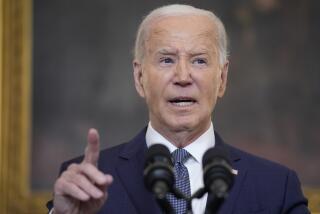U.S. Drafts Options to Aid Bosnia Army : Balkans: Clinton Administration complies with congressional order. But it cites risks and costs.
- Share via
WASHINGTON — The Clinton Administration has complied with Congress’ order to draft options for arming and training Bosnian government forces, but it warns that carrying out the proposal would be risky, costly and almost certain to jeopardize ties with major U.S. allies.
The scenarios, outlined in classified briefings with leading lawmakers this week, call for the United States to lift the current arms embargo unilaterally, to arm and train Bosnian government soldiers and to help evacuate allied troops now on peacekeeping duty in Bosnia-Herzegovina.
But officials have warned that the operation would require a substantial U.S. air campaign, to protect Bosnian forces during training, and the deployment of thousands of American ground troops, with a risk of widening the ground war to many more civilians. The cost could run as high as $4 billion, Administration officials said.
They also have cautioned that any unilateral lifting of the arms embargo would so anger major U.S. allies--such as the British, French and Dutch, who together have 19,000 ground troops in Bosnia--that U.S. planes might not be allowed to use North Atlantic Treaty Organization bases.
The Administration consistently has opposed any unilateral lifting of the arms embargo or outside training of Bosnian troops. But that position has been popular among lawmakers, many of whom are frustrated with the war and want to strengthen Bosnia’s government forces, which are largely Muslim.
However, officials said President Clinton may be hard-pressed to avert such a move after Republicans take control of Congress in January. GOP lawmakers have been among the most vigorous proponents of lifting the embargo unilaterally.
Under legislation passed earlier this year, Congress gave Clinton until Nov. 15 to persuade the U.N. Security Council to lift the embargo multilaterally. If the world assembly refused, the law required Clinton to cease using U.S. military personnel to help enforce the restrictions.
The law also required him to submit detailed plans for lifting the embargo unilaterally and for training Bosnian government troops outside Bosnia, where they are subject to the U.N. embargo.
Unable to get the 15-country Security Council to lift the embargo, Clinton issued orders last week prohibiting U.S. military forces from helping to enforce the embargo. But he said the United States would continue to abide by its terms and not sell arms to the Bosnian government troops.
Defense Department and intelligence officials flatly denied a report Thursday from Europe suggesting that the United States has been sharing satellite photos and other intelligence with the Muslim-led government following Clinton’s decision to stop enforcing the embargo.
The report, contained in the European, a London-based weekly newspaper, said that small teams of CIA operatives are working in Bosnia to train soldiers in military operations, provide them with satellite photos and control air traffic.
The options the Administration outlined to lawmakers this week involved essentially two alternative approaches:
One would be to pour enough tanks, artillery and weapons into Bosnian government hands to give its army the same level of equipment as the Bosnian Serbs.
The alternative would be to concentrate on exploiting government forces’ current advantage in manpower over the Bosnian Serb rebels by equipping them with more antitank weapons, rocket-propelled grenades and small arms to create a more effective infantry force.
Depending on the approach, U.S. officials said that arming the Bosnian government could cost between $500 million and $4 billion. And the move would bring on a spate of problems:
* Training the Bosnian forces fully would require a transitional period of a year or more, during which time they almost certainly would come under stepped-up attacks by the Serbs--which the United States would have to counter with a substantial air campaign.
* As soon as the United States lifted the embargo, Britain, France and the Netherlands would pull their peacekeeping troops out of Bosnia. Since Washington is committed to helping to evacuate them, Clinton would have to send in thousands of U.S. troops.
* Without U.N. peacekeeping troops on the ground, any U.S. warplanes sent to protect Bosnian government units would be forced to operate without the help of forward air observers, making their bombing less accurate and more likely to hit civilians.
* Renewed attacks by the Bosnian Serbs would widen the war to endanger more civilians than are being killed now and could well bring in neighboring countries such as Serbia and Croatia and even the major powers.
Separately Thursday, the State Department said that unidentified gunmen in Sarajevo fired shots into the rooms of U.S. Ambassador Vic Jackovic at the Holiday Inn motel but that Jackovic was not in the room. A State Department spokesman said there is no reason to believe that Jackovic was the target of the attack.
The Bosnian presidential offices in Sarajevo also were attacked by a wire-guided missile Thursday, leaving two people wounded, wire services reported.
More to Read
Sign up for Essential California
The most important California stories and recommendations in your inbox every morning.
You may occasionally receive promotional content from the Los Angeles Times.













